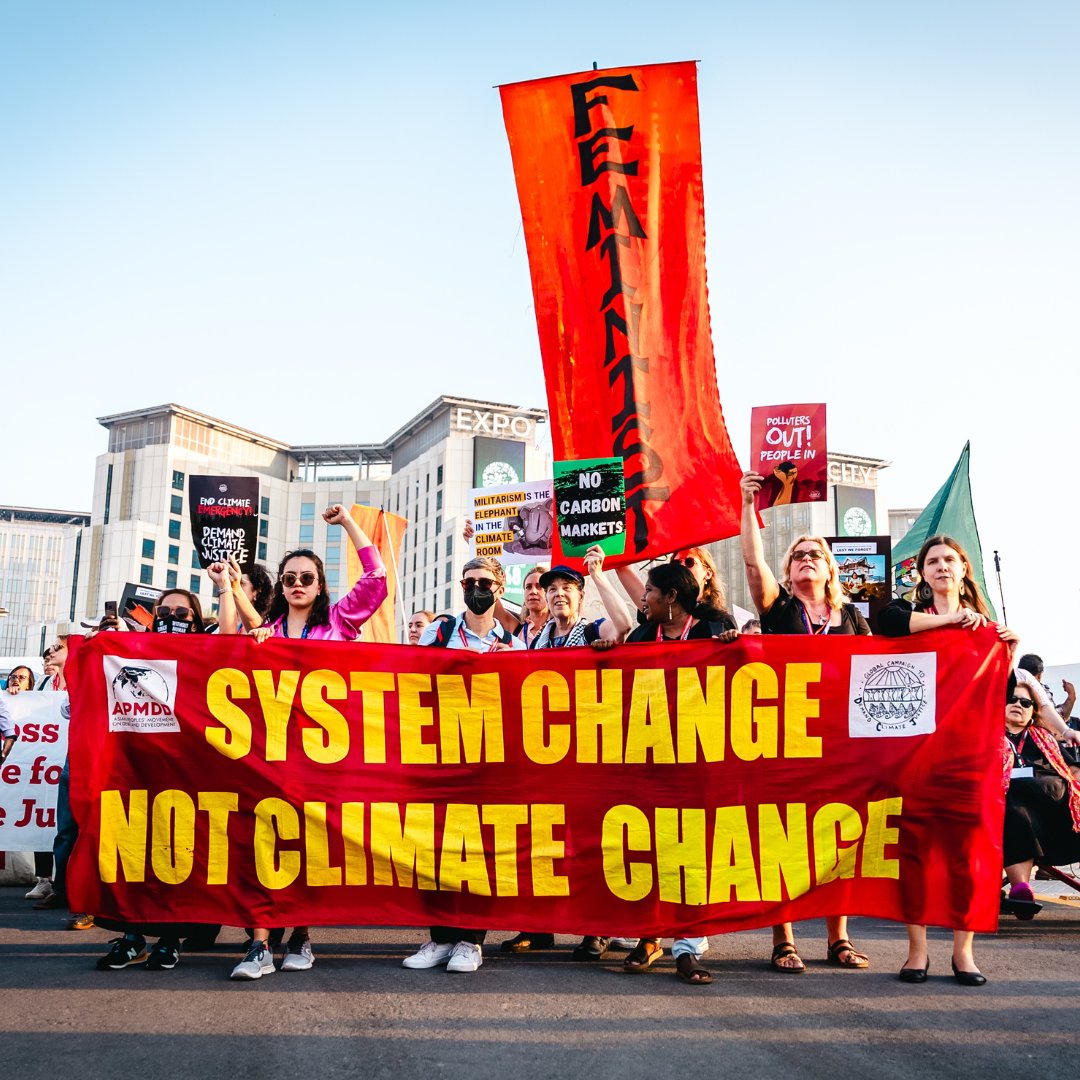Feminist Reflections From MENA And Global South On COP28
COP28 Outcomes: Addressing the Debt Crisis, Climate Finance Challenges, Ending Fossil Fuel Finance for a Livable Planet
Amid the drawn curtains on COP28, the global community witnessed both strides and setbacks in addressing pressing environmental issues. The acknowledgment of the need to shift away from fossil fuels marked a significant milestone, but the outcomes fell short of meeting the urgent requirements of communities worldwide, particularly in the Global South.
Critical Issues Unaddressed
One of the focal points at COP28 was the pressing issue of the debt crisis, a significant barrier to effective climate action. Despite global south governments, activists, and organizations emphasizing the importance of addressing debt, the agreements reached during the conference inadequately considered this critical aspect. The Global Stocktake, a key influencer of future climate actions, only briefly referenced debt, and tangible commitments to grant-based climate finance were notably absent.
Pledges for adaptation finance at COP28 fell short of expectations, with the final text lacking assurances of payment by rich countries and removing references to debt sustainability. The emphasis on greater private sector and multilateral development bank involvement in delivering climate finance raised concerns about increased loans to Global South countries.
Grant-Based Climate Finance Shortfalls at COP28
COP28 struggled to ensure adequate, grant-based climate finance for Global South countries, a crucial element for transitioning away from fossil fuels and addressing the climate crisis. Despite operationalizing the Loss and Damage Fund, uncertainties lingered, with no obligations for rich countries to contribute and lingering doubts about its effectiveness.
Urgent Call for Debt Justice: A Matter of Justice, Not Charity
Civil society, including MenaFem Advocates for Climate Justice, called for urgent debt cancellation, emphasizing that addressing debt is a matter of justice, not charity. we highlighted the need for legislative reforms in key jurisdictions to overcome obstacles posed by private creditors and advance debt relief. Long-term solutions were proposed, including the introduction of a sovereign debt workout mechanism to incentivize responsible lending.
Rich Nations Urged to Fulfill Climate Debt Commitments
A strong plea was made for rich countries to fulfill their climate debt through adequate, grant-based, public, new, and additional climate finance. The focus on effective solutions and caution against distractions from inadequate proposals were highlighted to ensure meaningful progress in the global fight against climate change.
In conclusion, it is imperative that we resist the allure of seemingly innovative instruments and initiatives that purport to tackle the debt crisis and address climate finance gaps. While some of these proposals may appear promising, many are, at best, insufficient or, at worst, have the potential to worsen the debt crisis, hindering effective climate action. Our focus must steadfastly remain on pragmatic and effective solutions that will truly contribute to overcoming these challenges and propel us toward a sustainable and resilient future.
Quotes:
Shereen Talaat, MenaFem Movement For Economic, Development and Ecological Justice.
pay us back, we must recognize that true climate justice is unattainable under occupation and oppressive regimes. Despite adequate public finance for our climate needs, the problem lies in an undemocratic global economic system dominated solely by wealthier northern countries. The MENA region is grappling with numerous ecological crises. For instance, Morocco, within my region, recently endured a devastating earthquake, signaling that this is only the beginning of the challenges we face.
Our most vulnerable nations, such as Egypt from where i am coming, Pakistan, and Ukraine, grapple with additional charges called surcharges imposed by the IMF. Sometimes reaching 100% of the debt, these surcharges exacerbate our struggles. For example, Pakistan, facing ecological crises, pays around 360 million yearly. The call is clear: start with eliminating IMF surcharges. However, the issue extends beyond allocation; it’s about power dynamics within the IMF. Reissuing Special Drawing Rights (SDRs) is a potential solution, but it’s hindered by the IMF quota system, favoring those with larger shares. We demand a restructuring of this colonial legacy, where the same influential countries control decisions. Our voices must be heard, and it’s time to create an international alternative to the current system.
Lidy Nacpil, The Asian People’ Movement on Debt and Development
We advocate for debt cancellation based on our inherent justice arguments; we don’t owe, but, in fact, rich countries owe us. Over a trillion dollars is a net resource flow from the south to the north each year. Merely achieving domestic zero emissions isn’t sufficient; they must finance a significant portion of mitigation efforts in the south to account for their historical fair share.
When discussing the phasing out of fossil fuels in the south, as highlighted by Sandra, it comes with substantial costs. There will be significant revenue losses, and extensive replacements are needed for fossil fuel energy. The transition to renewable energy in the south must outpace the phase-out of fossil fuels, addressing prevalent energy poverty.
We stress that climate finance delivery isn’t a mere necessity for us; it’s a debt owed to the south. It’s an obligation and a fair share owed by developed countries and wealthy governments.
Omar Elmawi, Movement of Movements
On the first day when they announced the damage fund, many of us felt a sense of victory and optimism, didn’t we? However, let’s not forget the core reason we’re gathered here— the climate crisis. The true success of COP28 hinges on their commitment to phasing out fossil fuels and ramping up renewable energies. Only then can we genuinely claim victory.





